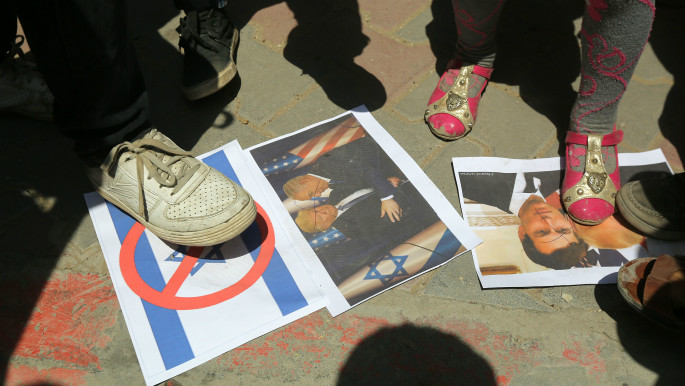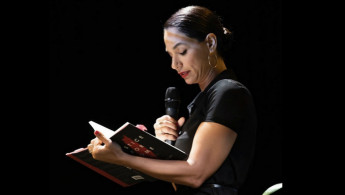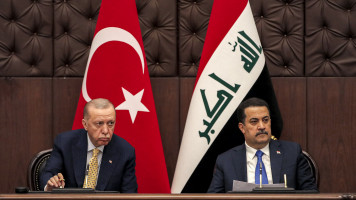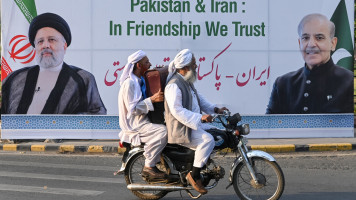Unravelling power, control and the misuse of international law for Palestine with Noura Erakat
"The greater anxiety wasn't about writing another book about international law on Palestine, it was writing another book about Palestine," the Palestinian-American legal scholar and commentator conceded.
"Because it's been 100 years, there's been so many works on it... That was the fear about writing a book on Palestine."
Despite this, after it was published in mid-2019, Justice for Some went on to receive positive reviews, including esteemed words from American civil rights activist and scholar Angela Davis and Palestinian author Raja Shehadeh.
Erakat also embarked on a promotional tour across seven countries, 24 cities and about 30 different lectures and talks. Her book was also awarded the coveted Palestine Book Award for Best Academic Book at the tail-end of the year.
 |
|
| Read also: 'Deal of the Century': Palestinians feel letdown but can they resist American and Israeli dictation? |
"The reaction to the book has been tremendous. I had become so familiar with, and immersed in, the material during the writing process, that I did not expect a robust response," Erakat told The New Arab.
"So the fact that it's been the exact opposite, that it's been well-received by a popular and academic audience, who have appreciated the book for what it's done in terms of helping them think through the question of Palestine… produces deep satisfaction."
In a nutshell, Justice for Some unravels the power, control and misuse of international law when it comes to Palestine and provides a new approach to understanding the Palestinian struggle for freedom.
 |
Justice for Some unravels the power, control and misuse of international law when it comes to Palestine and provides a new approach to understanding the Palestinian struggle for freedom |  |
Erakat's levelled critique and clear legal analysis stretches from the Balfour Declaration in 1917 to the most recent onslaughts of Gaza and continuing illegal settlement expansion.
However, she makes it clear that she didn’t write her book as a blueprint for lawyers, as a handbook on how to use international law in the context of Palestine. She said she wrote it for perspective, and to show how the strategic deployment of law has shaped current conditions.
"My book is distinct from other books on international law in Palestine because it takes a more critical approach to the understanding of the relationship between law and politics," Erakat explained.
"It doesn't assume that the law is going to save us or that the law has been misinterpreted and should be interpreted differently or better.
"I am exploring what the law is doing and how it's affecting our lives and I wanted to do that over a hundred years in order to demonstrate its associated risks and possibilities."
|
|
|
Erakat highlights that none of the Israel-Palestinian conflict's biggest challenges have ever been resolved by judicial intervention.
For example, occupation law has failed to halt Israel's illegal settlement expansion, the siege and military offensives on the Gaza Strip were permitted under laws of war, and the Oslo Accord and two-state solution are effectively dead in the water.
While the law has done more to advance Israel's interests than the Palestinians', Erakat argues in Justice for Some that this outcome was never inevitable.
Read also: Palestine +100: Stories from a century after the Nakba
She told The New Arab that the Oslo Accords essentially "bifurcated" what was historically a holistic approach of using a rights-based discourse alongside a political strategy. She also argued that Palestinian human rights and civil society organisations have – especially since the early 2000s – started to emphasise international law as "the corrective to everything that the Palestinian leadership was doing" in order to be able to level a critique of the Palestinian leadership even in the absence of a representative political body.
"Especially since the 2005 BDS Call, based on international law and human rights norms, a rights-based approach has seemingly overshadowed a political framework," Erakat said.
"I do agree that the international law on its own can be de-politicising, but I also am recognising that it's not the law that's the problem. It's the absence of more robust politics. That, together with the law’s susceptibility to manipulation, makes the invocation of law more risky.
"Laws could and should be used, but primarily as a defensive force to create more room for political activism."
She added: "We see that now, very clearly, in the US where the attack on BDS is full frontal, the equation of anti-Zionism with anti-Semitism… and also in the UK, where Boris Johnson now wants to criminalise BDS.
"They and the right-wing Zionist groups have come after Palestinian organisations, legal organisations, rights organisations.
"That's where the law can be used as a defensive function, where it can be used more aggressively and more assertively.
"We need a more robust Palestinian politics that guides it and is able to articulate what freedom is what the future is and to use the law in the service of that vision."
 |
We need a more robust Palestinian politics that guides it and is able to articulate what freedom is what the future is and to use the law in the service of that vision |  |
A recurring theme throughout Justice for Some is the concept of the sovereign exception. Erakat defines this as a unique legal arrangement underpinned by the insistence that there exists a unique fact pattern for which no applicable law applies – thus placing it beyond the bounds of legal contestation.
Only the most powerful actors can declare such an exception, Erakat explains, and challenging it necessitates challenging the geopolitical framework sustaining the exception.
"The idea about the sovereign exception revealed itself to me as I was writing the book," Erakat reflected.
"I started in chapter five, which is the last chapter of the book, because I started writing the book in the aftermath of the last of the most recent large-scale offensive against Gaza.
"I was writing about the shift from occupation to warfare in the context of Israel's systematic assaults on the besieged Palestinian population within the Gaza Strip.
"There, the sovereign exception is very clear… They basically create a tremendous amount of space to create new laws in order to crush Palestinian resistance and justify a grotesque register of death and destruction."
Erakat went on to explain how she noticed more examples of the sovereign exception emerge as she worked her way backwards in the timeline of the conflict, but it wasn’t until the last chapter she wrote – the background chapter starting at 1917 – that it all came together.
While Erakat said it took her three years to write Justice for Some – from beginning to end in terms of research, writing and revisions – she said the book reflected about 15 years of her activism and legal education and advocacy.
She said the biggest challenge she faced while writing the book was that she had to put aside her activism work.
"For so many activists we're driven by a feeling the world is burning and we have to be fighting all the time in order to put out the fire," she recalled.
"That is a different tempo in life, a different orientation to the world than an orientation that a scholar has, which is contemplated, patient, long breath, quiet, isolated, a lot of reading, writing, by yourself all the time.
"So the shift from being on the ground constantly, buzzing with high tempo and urgency and quick rapid response, to pulling away from the street to sit alone and write – what I had to get over was the guilt of not being part of the struggle in that moment.
"That's really hard for anybody trying to make similar transition and yet what I found is that, as others have emphasised over and over again, the struggle will remain... and more importantly, that pulling away and coming back will actually make you stronger."
Noura Erakat’s book Justice for Some: Law and the Question of Palestine is out now through Stanford University Press
Elias Jahshan is an editor and freelance writer based in London. He is a contributor to Arab, Australian, Other: Stories on Race & Identity, out now through Picador.
Follow him on Twitter: @Elias_Jahshan
Read more from The New Arab Meets special section below:




